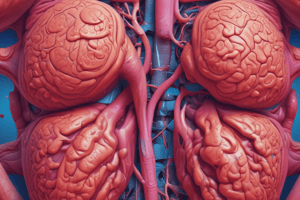Podcast
Questions and Answers
Which condition is characterized by the formation of a fibrotic plaque on the tunica albuginea?
Which condition is characterized by the formation of a fibrotic plaque on the tunica albuginea?
- Hypertension
- Atherosclerosis
- Diabetes mellitus
- Peyronie disease (correct)
What is typically the psychological implication if nocturnal penile tumescence is present in a patient with ED?
What is typically the psychological implication if nocturnal penile tumescence is present in a patient with ED?
- The cause is likely psychogenic. (correct)
- The cause is likely vascular.
- The patient should immediately seek surgery.
- The ED is due to medication effects.
Which class of medication is commonly associated with causing erectile dysfunction?
Which class of medication is commonly associated with causing erectile dysfunction?
- Antiparkinsonians
- Anticonvulsants
- Antihypertensives (correct)
- Antibiotics
What psychological factors can contribute to erectile dysfunction?
What psychological factors can contribute to erectile dysfunction?
What is a shared risk factor between cardiovascular disorders and erectile dysfunction?
What is a shared risk factor between cardiovascular disorders and erectile dysfunction?
If erectile dysfunction appears suddenly without any surgical history, what is the most appropriate interpretation?
If erectile dysfunction appears suddenly without any surgical history, what is the most appropriate interpretation?
Which physiological process is primarily responsible for an erection?
Which physiological process is primarily responsible for an erection?
What common sexual disorder often coexists with decreased libido?
What common sexual disorder often coexists with decreased libido?
What diagnostic procedure may be utilized to differentiate between psychogenic and physiologic causes of ED?
What diagnostic procedure may be utilized to differentiate between psychogenic and physiologic causes of ED?
What type of treatment involves the use of a nonspecific phosphodiesterase inhibitor?
What type of treatment involves the use of a nonspecific phosphodiesterase inhibitor?
Which hormone is essential for maintaining nitric oxide levels in relation to erectile function?
Which hormone is essential for maintaining nitric oxide levels in relation to erectile function?
Which of the following conditions is NOT typically associated with erectile dysfunction?
Which of the following conditions is NOT typically associated with erectile dysfunction?
What common substance use is known to lead to erectile dysfunction?
What common substance use is known to lead to erectile dysfunction?
What is a possible result of neurologic disorders concerning erectile dysfunction?
What is a possible result of neurologic disorders concerning erectile dysfunction?
Which test can be performed with a monitoring device to assess nocturnal erections?
Which test can be performed with a monitoring device to assess nocturnal erections?
How does phosphodiesterase 5 enzyme inhibitors, like sildenafil, affect erectile function?
How does phosphodiesterase 5 enzyme inhibitors, like sildenafil, affect erectile function?
What surgical option may be considered for severe cases of erectile dysfunction that are unresponsive to other treatments?
What surgical option may be considered for severe cases of erectile dysfunction that are unresponsive to other treatments?
What is the effect of smoking on nitric oxide levels in relation to erectile dysfunction?
What is the effect of smoking on nitric oxide levels in relation to erectile dysfunction?
At what age does erectile dysfunction commonly start to become more prevalent?
At what age does erectile dysfunction commonly start to become more prevalent?
What lifestyle factor is associated with a higher risk of developing erectile dysfunction?
What lifestyle factor is associated with a higher risk of developing erectile dysfunction?
Flashcards are hidden until you start studying
Study Notes
Erectile Dysfunction (ED)
- Definition: The recurring or consistent inability to attain or maintain a penile erection sufficient for intercourse.
- Prevalence: Most common sexual disorder, starts around age 40, more prevalent in older men.
- Causes: Psychological, Endocrine, Neurogenic, Insufficient blood flow, Substance Use.
- Risk Factors: Obesity, smoking, sedentary lifestyle, obstructed sleep apnea, infrequent sexual intercourse.
- Psychological Causes: Anxiety, depression, guilt, stress, relationship issues.
- Neurological Causes: Disruption in brain and spinal cord signals, affecting erection center in spinal cord (T11-L2) and sacral erection center (S2-S4), leading to ED. Examples: stroke, multiple sclerosis, dementia.
- Endocrine Causes: Low testosterone levels can cause decreased libido and ED.
- Testosterone maintains nitric oxide levels crucial for erections.
- Nitric oxide relaxes the corpora cavernosa, maximizing blood flow and penile engorgement.
- Thyroid disorders (hypothyroidism) and hyperprolactinemia can disrupt testosterone production and lead to ED.
- Vascular Causes: Cardiovascular disorders (arteriosclerosis, hypertension) often associated with ED.
- Shared risk factors with ED.
- ED can be an early warning sign of cardiovascular disease.
- Hyperlipidemia, diabetes mellitus, smoking cause vascular dysfunction leading to ED.
- Pelvic trauma and prostate surgery can disrupt vascular and neurological function, causing ED.
- Pharmacotherapeutic Causes:
- Antihypertensives, antidepressants, antipsychotics, antiandrogens.
- Substance use (alcohol, cocaine) can cause ED.
- Anatomic Causes:
- Peyronie disease: Fibrotic plaque formation on the tunica albuginea, causing curved or bent penis, pain, and ED.
- Cause unknown, but genetic predisposition, trauma, and local ischemia can contribute.
- Diagnostics:
- History and examination.
- Laboratory evaluation: glucose testing, lipid profile, thyroid hormone and testosterone levels.
- Nocturnal penile tumescence (NPT) testing: differentiates psychogenic from physiologic ED.
- Ultrasound and dynamic infusion cavernosometry/cavernosography: identify vascular disorders like arterial obstruction or venous leakage.
- Treatment:
- Addressing physiologic causes.
- Psychological counseling.
- Testosterone replacement.
- Phosphodiesterase 5 inhibitors, adrenergic antagonists.
- Herbal remedies.
- Prostaglandin E injections or intraurethral insertion.
- Penis pumps or vacuum devices.
- Penile implants.
- Vascular surgery.
Studying That Suits You
Use AI to generate personalized quizzes and flashcards to suit your learning preferences.




